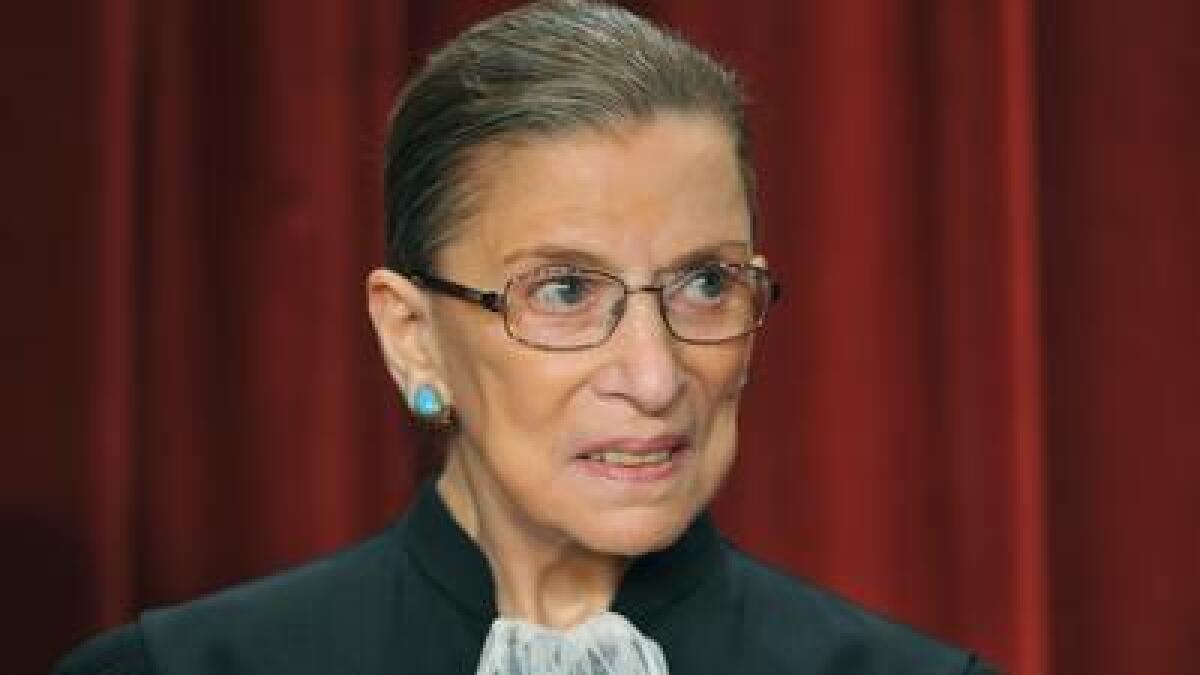Is Ruth Bader Ginsburg too old to be a Supreme Court justice?

- Share via
How old is too old for a Supreme Court justice?
Eighty-year-old Justice Ruth Bader Ginsburg has told a reporter that she is in excellent health and plans to remain on the court for several more years. Ginsburg told Joan Biskupic of Reuters that she wants to stay on the bench at least as long Justice Louis Brandeis, which would mean remaining until April 2016. She also said her new “model” was Justice John Paul Stevens, who retired at the age 90 in 2010. (Stevens is still active on the public-speaking circuit.)
Ginsburg’s refusal to retire has cheered some liberals and dismayed others who believe she should step down before the end of the Obama administration to ensure that she is replaced by someone equally (or more) liberal.
That sort of calculation may be unseemly, but justices are free to time their retirements to maximize the preservation of their point of view. No doubt many conservatives are hoping that Ginsburg’s personal friend and ideological opposite Antonin Scalia, who is 77, will put off his retirement until a Republican president is in office.
Federal judges serve for life. Periodically, someone proposes that the Constitution be amended to allow for mandatory retirement of judges, but that seems unlikely.
Alternatively, it has been suggested that Congress could enact a statute requiring Supreme Court justices to surrender their places on that court -- but not their status as federal judges -- on reaching a certain age.
Mandatory retirement at 70 for judges is common at the state level, though two states -- New York and Pennsylvania -- are moving toward raising the retirement age for some or all of their judges. (The proposed new retirement age in Pennsylvania is 75; in New York, it would be 80.)
The advantage of a retirement age is that it makes it unnecessary to determine whether a particular judge has been impaired by advanced age. A mandatory retirement age won’t take account of cases in which a particular judge could serve ably into his or her 90s. But that’s true of all bright lines in the law: Some 17-year-olds would cast more knowledgeable votes than those cast by some 18-year-olds. Some 34-year-olds are better qualified to be president than some 35-year-olds (and some 60-year-olds, for that matter).
A retirement age for Supreme Court justices -- I would suggest 75 -- would deprive the court of the services of justices such as Stevens. But it also would spare the court and the nation the problem posed by elderly justices who won’t recognize that it’s time for them to step down.
Everyone agrees that Stevens was still at the top of his form in his 90s. But other justices in recent history, including William O. Douglas and Thurgood Marshall, clung to office for too long.
The idea of a mandatory retirement age -- one that wouldn’t affect justices already on the bench -- is worth some dispassionate discussion.
ALSO:
Sadly, Arizona firefighters’ deaths become political fodder
Vatican infighting: We told you two popes could be a problem
More to Read
A cure for the common opinion
Get thought-provoking perspectives with our weekly newsletter.
You may occasionally receive promotional content from the Los Angeles Times.










